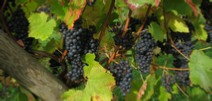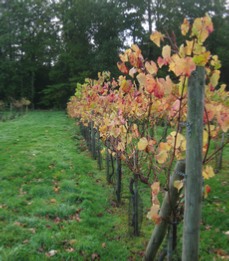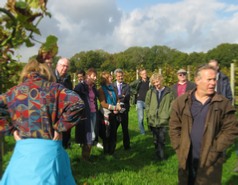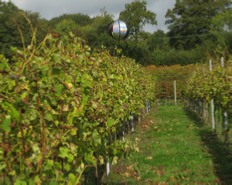

Web design © Graeme de Lande Long. Terms & Conditions.



Community Website
Scaynes Hill Village
On what threatened to be a morning of heavy showers about 16 people gathered at Rock Lodge Vineyard for a tour of the vineyard by David Perrin, the manager of the Plumpton College run estate. The showers never materialised and the tour around the vineyard was fascinating. David guided us around the 7 hectare (17 acre) vineyard indicating the different grape varieties being grown, the various training systems and the experiments studying different rootstocks and plant spacing.
Timing the harvest is critical so the grapes are carefully monitored for sugar and acid content. Visual inspection and tasting is the first step, which is backed up by use of a field spectrometer to measure accurately the sugar content. When this seems about right a sample of 100 grapes is taken from different locations and taken to Plumpton for accurate laboratory testing of both sugar and acid content, which determines precisely the right time for picking.

Some of the original vines planted 50 years ago are still bearing fruit but will need replacing soon. The vineyard has recently been expanded with new vines, which will start producing grapes after only 3 years. There are about two dozen grape varieties, many of them German, with rather unfamiliar names like Schonberger, Dornfelder and Acolon but also some more familiar ones (eg Riesling, Pinot Noir & Chardonnay), which produce different characteristics that can be blended to make a range of wines.
However, the vineyard is not just run for research. After harvesting the grapes they are taken to Plumpton College for processing and last year they produced about 30,000 bottles of wine in 7 different varieties for commercial sale. These can be bought in several local retailers, South Downs Cellars in Lindfield and the new garden centre Upcountry in Scaynes Hill to name two (see the current year's portfolio list). When the entire area is producing grapes they should be able to produce up to 50,000 bottles per year which is about the capacity of the wine making facilities at Plumpton.
Many thanks to David Perrin for giving up so much time to make it such an interesting morning. It is hoped next year to arrange another tour, this time of the wine making facilities at Plumpton College, with the possibility of some wine tasting too, so keep an eye out on the website for notice of such an event.
See also Mike Lavelle's account of taking part in the grape harvesting last year.

Much of the work on the vineyard and harvesting is done by the students at the college and all the data, including planting, maintenance and yield is meticulously recorded and much of the research being done is published or shared with others through such organisations as the UK Vineyard Association. Maintenance involves keeping diseases, pests, weeds etc under control as well as keeping birds and deer away from the vines. Rabbits may also chew the bark of the vines if they are really hungry but do not seem to be too much of a problem. Spaying of herbicides and pesticides is subject to legislative control and so has to be closely monitored. To keep the birds away there are recorded calls of birds of prey broadcast at intervals as well as brightly coloured balloons with faces on them, which rotate in the breeze.

Vineyard tour
25-Oct-14 posted by Graeme de Lande Long



